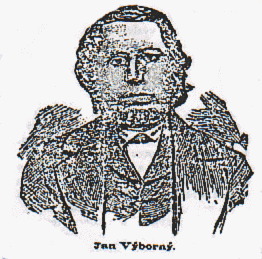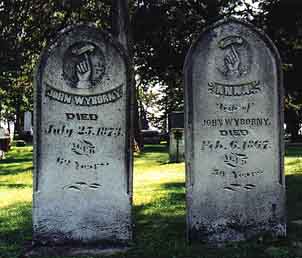
The author uses the Vyborny
spelling throughout the text, although it is clear that
Jan, in most circumstances, spelled the name Wyborny.
Existing archive documents show Jan's year of birth to be
1811. This year is used below, rather than the 1806 that
appeared in Vratislav's original manuscript.
Text:
JAN (John) VYBORNY was born
in the year 1811 in Libenice, Caslav Region of Bohemia,
where he was raised, and in his 28th year he took ANNA
RUZICKA as his life companion, and in their happy
marriage had five sons and one daughter. However time
passed, and his sons were growing up, as the eldest son
was already 15 years old, and he was thinking of what to
do when all his sons grew up, because he loved them very
much and he knew very well that the government would
quickly dress tnem into army coats. Although he did not
have a higher education he nevertheless possessed a great
inclination to observe and discover what is happening in
the world.
He especially was not a great friend of the
priesthood, as he almost knew the entire bible by memory,
which often resulted in scenes with the local Catholic
priest so that at times he was officially put on report,
as it is known, that this black mob leaves nobody at
peace when things are not of their liking, or if sombody
only slightly speaks up to them, perhaps defending his
rights, and immediately he has unpleasantries.
It also once happened through the baptism of one
child, when the father was of the
evangelic Protestant religion
and the mother was a Catholic, and here the Catholic
priest wanted to convince him to baptise the child to the
Catholic faith, to which he very strongly objected; so
that they had a rather unpleasant scene. Even though the
priest did not attain his wishes, his vengeance was not
finished and so he kept the father in mind. One time when
he had a boil on his leg,and was hauling manure to the
field, and at the same time a procession passed by, he
walked bent over, limping along side the wagon, not
uncovering his head. A short time after he was placed on
report, stating that he behaved improperly toward a
religious procession,and that he ridiculed it. This made
him very angry, and he composed a song about them, which
was immediately banned.
During his stay in Bohemia he was also acquainted with
Karel Havlicek, and read many of his writings. He
subscribed to the "Slovan", which Mr. Havlicek
published at that time in Kutna Hora, and which he
diligently read-and brought all the way to America.
In 1850 he resolved to leave Bohemia, which was
difficult for him, but due to unbearable conditions of
subjection his family also urged him, so his goal was the
promised land, free America, to where he also urged
Havlicek, but he would not concede, saying he would
rather stay in Bohemia, where he would prefer to die for
the benefit of the nation.
Glory and honor to his spirit.
At that time my father sold out his holdings, and in
1851 abandoned Bohemia. After 7 weeks on a sailboat of an
unpleasant voyage, arrived successfully to New York, from
where he set out at once further west to Wisconsin,
coming to Milwaukee where he stayed for a while.
Discussion:
The story of Jan (*1811) then continues
for ten times the length of the text above. It
describes the incredible hardships of those who settled
the Great Plains in the middle of the nineteenth century
and those who had the fortitude to overcome them. It is a
tribute to the courage and perseverance of the common
man. Jan Vyborny died in 1874. His wife had proceeded him
in death by several years and in perhaps a softening of
his religious views near the end of his life both are
buried in the Catholic cemetary in Mitchell Iowa. The
name on their headstones is Wyborny.

Photo of graves of John and of Anna, Mitchell, Iowa.
(click to
enlarge the picture)
Contact:
lw@vyborny.com
Last updated: Oct 12, 1999